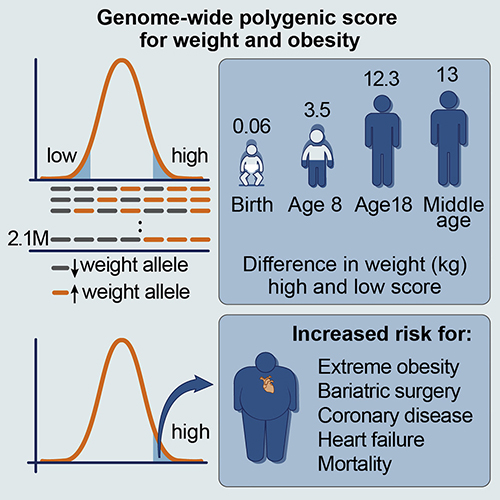With nearly 40% of American adults considered obese, a ‘polygenic score for obesity’ could be a positive development for clinical laboratories
Obesity often is stigmatized as a condition blamed solely on lifestyle choices and overeating. But is that true for all people? Now, a polygenic score for obesity developed by the Broad Institute may enable clinical laboratories to help doctors determine their patients’ inherent risk for becoming overweight throughout their lifetimes.
Researchers at the Broad Institute of Massachusetts Institute of Technology (MIT) and Harvard have developed a $50 genetic test that they suggest could be used to predict a person’s risk for obesity from birth through adulthood.
Given the role of obesity in a wide range of diseases and health conditions, development of a genetic test panel for obesity would give clinical laboratories a way to help physicians with this health condition. Experts believe there would be strong consumer and physician demand for the test, after clinical studies validate these early findings.
Dark Daily previously covered the use of polygenic scoring to determine risk for chronic diseases in “Polygenic Scores Show Potential to Predict Humans’ Susceptibility to a Range of Chronic Diseases; New Clinical Laboratory Genetic Tests Could Result from Latest Research.”
Could Medical Laboratory Test Quantify a Person’s ‘Susceptibility’ to Obesity
The Broad Institute scientists published their study, “Polygenic Prediction of Weight and Obesity Trajectories from Birth to Adulthood” in the journal Cell. Co-first author Amit V. Khera, MD, Associate Director, Precision Medicine Unit, at the Massachusetts General Hospital Center for Genomics Medicine (CGM), and Associate Director, Cardiovascular Disease Initiative, Broad Institute of MIT and Harvard, believes early intervention could help ward off health conditions associated with obesity, such as diabetes, heart disease, and stroke.
“You can overcome your genetics, but some people have to work a little harder than everyone else to maintain a normal weight,” Khera told PBS.

According to a Broad Institute news release, Khera and his associates designed a “genome-wide polygenic score” that uses more than two million common genetic variants to quantify a person’s likelihood of becoming obese. They found nearly a 29-pound weight difference between middle-aged adults with the highest and lowest scores. And a 27-pound plus weight difference in 18-year-olds with scores at opposite ends of the spectrum. In addition, they note the polygenic score’s effect on weight emerges early in life and increases into adulthood.

To develop the polygenic score, the researchers compiled data from the 2015 BMI Genome-wide Association Study on obesity. Using new computational algorithms, they distilled the information into a single number—or score—for each individual. The scoring algorithm was validated based on data from 119,951 individuals in the UK Biobank, and then used to explore obesity in additional groups totaling more than 300,000 individuals from the UK Biobank, Framingham Offspring and Coronary Artery Risk Development in Young Adults study, and the Avon Longitudinal Study of Parents and Children, noted the Broad Institute news release.
Experts’ Views on Obesity Test Vary
Not all scientists are convinced the Broad Institute’s genetic-centric approach to studying obesity is time and money well spent.
“In all fairness, we don’t know whether all of these variants really matter,” epidemiologist Cecile Janssens, Professor at Emory University, told PBS. When asked about the value of doing a study like this, she said, “I have no clue.”
Other experts question whether a genetic test for obesity would change patient behavior.
“This kind of personalized risk information has little [to] no impact on people’s actual behavior,” Theresa Marteau, PhD, Director of the Behavior and Health Research Unit at the University of Cambridge, told NPR, which also pointed out that “17% of the people [in the Broad Institute study] with the highest scores had normal body weights.”
Nevertheless, some doctors are positive about the Broad Institute’s new tool.
“I hope this work will hopefully destigmatize obesity and make it very similar to every other disease, which is a combination of both lifestyle and genetics,” research team co-leader Sekar Kathiresan, MD, Co-Director, Program in Medical and Population Genetics at Broad Institute, told NPR.
“This analysis of the heritability of obesity could lower stigma by making it clear that weight gain is not the result of laziness, poor choices, or a lack of willpower,” he added.
While more studies will need to be done to validate the use of a polygenic scoring in fighting obesity, the Broad Institute’s research provides a foundation for developing such a test. An FDA–approved predictive genetic test for obesity would be a welcomed addition to clinical laboratory testing menus and could change how society views obesity.
—Andrea Downing Peck
Related Information:
This Genetic Test Can Predict Your Odds for Obesity from the Day You’re Born
Calculating Genetic Risk for Obesity
Genetic Studies of Body Mass Index Yield New Insights for Obesity Biology
How Helpful Would a Genetic Test for Obesity Risk Be?
Is Genetic Testing of Value in Predicting and Treating Obesity?
Polygenic Prediction of Weight and Obesity Trajectories from Birth to Adulthood
The Genetics of Obesity Polygenic Scores Show Potential to Predict Humans’ Susceptibility to a Range of Chronic Diseases; New Clinical Laboratory Genetic Tests Could Result from Latest Research



